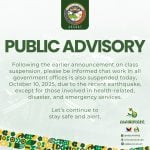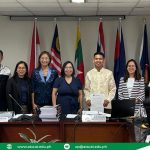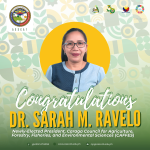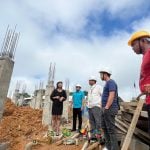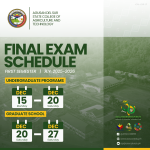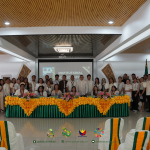ASSCAT and DOST Unveil Agri-Incubator for Local Startups






































































Read More ...
PUBLIC ADVISORY: Suspension of Work Due to Earthquake
ASSCAT BOT Holds 145th Meeting, Swears in New Student Trustee
Congratulations, Dean Ravelo!
𝗕𝗔𝗪𝗔𝗟 𝗔𝗡𝗚 𝗦𝗨𝗕𝗦𝗧𝗔𝗡𝗗𝗔𝗥𝗗 𝘂𝗴 𝗚𝗛𝗢𝗦𝗧 𝗣𝗥𝗢𝗝𝗘𝗖𝗧𝗦!
In a landmark event during the 2025 Regional Science, Technology, and Innovation Week (RSTW) in Caraga, the Agusan del Sur State College of Agriculture and Technology (ASSCAT) officially launched its Agri-Based Technology Business Incubator (ABRI Agri-TBI) on August 1 at its Main Campus in Bunawan, Agusan del Sur.
Spearheaded by the Department of Science and Technology (DOST), the event was attended by key national and regional science leaders including Secretary Dr. Renato U. Solidum Jr., Undersecretary for Regional Operations Engr. Sancho A. Mabborang, and DOST Caraga Regional Director Engr. Noel M. Ajoc. They were warmly received by ASSCAT President Dr. Joy C. Capistrano, with the strong presence and support of Agusan del Sur Governor Hon. Santiago B. Cane Jr., Bunawan Mayor Hon. Sylvia B. Elorde, and stakeholders.
In her address, Dr. Capistrano emphasized that ABRI is not merely a physical facility but a shared vision for innovation-led rural development. She affirmed that the initiative is rooted in the ideals of national foresight and local aspiration, aligning with DOST’s Pagtanaw 2050 and ASSCAT’s institutional roadmap Panglantaw 2030. The convergence of these strategic frameworks is reflected in ABRI’s core mission: to foster smart, inclusive, and sustainable agricultural innovation. Through circular agricultural economies, human-centered technologies, and AI-driven solutions, ABRI seeks to directly contribute to several United Nations Sustainable Development Goals (SDGs), particularly SDG 2 (Zero Hunger), SDG 8 (Decent Work and Economic Growth), SDG 9 (Industry, Innovation, and Infrastructure), and SDG 11 (Sustainable Cities and Communities).
The establishment of the facility was made possible through a ₱3 million grant from the Department of Science and Technology, complemented by a ₱2 million counterpart funding from ASSCAT. This joint investment enabled the college to acquire essential equipment, incubation tools, training programs, and conduct benchmarking activities in preparation for full implementation. Dr. Capistrano emphasized that this is only the beginning of a long-term commitment: ABRI will begin by supporting five student-led agri-tech startups in 2025, expand to 10 incubatees from other HEIs in 2026, and accommodate 15 startups and MSMEs by 2027. She expressed deep gratitude to DOST for its unwavering support, to PGAS and the LGU of Bunawan for their critical roles in enabling inclusive innovation, and to all stakeholders who share ASSCAT’s vision of delivering “Agham na Ramdam”—science that is truly felt by the people.
In his keynote message, Secretary Solidum underscored that ABRI is a key component of the national agenda to strengthen grassroots innovation ecosystems. He linked the initiative to DOST’s Elev8PH and PROPEL programs, designed to bring science closer to the people and generate region-specific solutions to local challenges. He also highlighted enabling legislation such as Republic Act 11914, which institutionalizes the presence of DOST at the provincial level, and RA 11337, the Innovative Startup Act, which provides the legal and funding framework to support startup development across sectors. He described ABRI as an “open gateway”—true to its name—to opportunity, technology, and transformation in the countryside.
Undersecretary Mabborang also recognized the significance of ASSCAT’s initiative, pointing out that rural-based TBIs like ABRI are powerful catalysts for strengthening local economies. He emphasized that innovation and entrepreneurship must be accessible even in far-flung areas and tailored to the unique needs of communities. He expressed confidence that Caraga’s innovation potential—particularly in agriculture, fisheries, and agroforestry—can be unlocked through platforms like ABRI.
The launch of ABRI during RSTW 2025 represents more than a milestone for ASSCAT; it is a shared victory for the region. It exemplifies how collaboration between national government agencies, local governments, academic institutions, and community leaders can create a responsive innovation ecosystem rooted in rural realities. With the combined support of DOST, PGAS, and LGUs, ABRI opens a new chapter for Agusan del Sur—where homegrown ideas are nurtured, local challenges are solved with science, and inclusive growth becomes not just a goal, but a lived experience.

